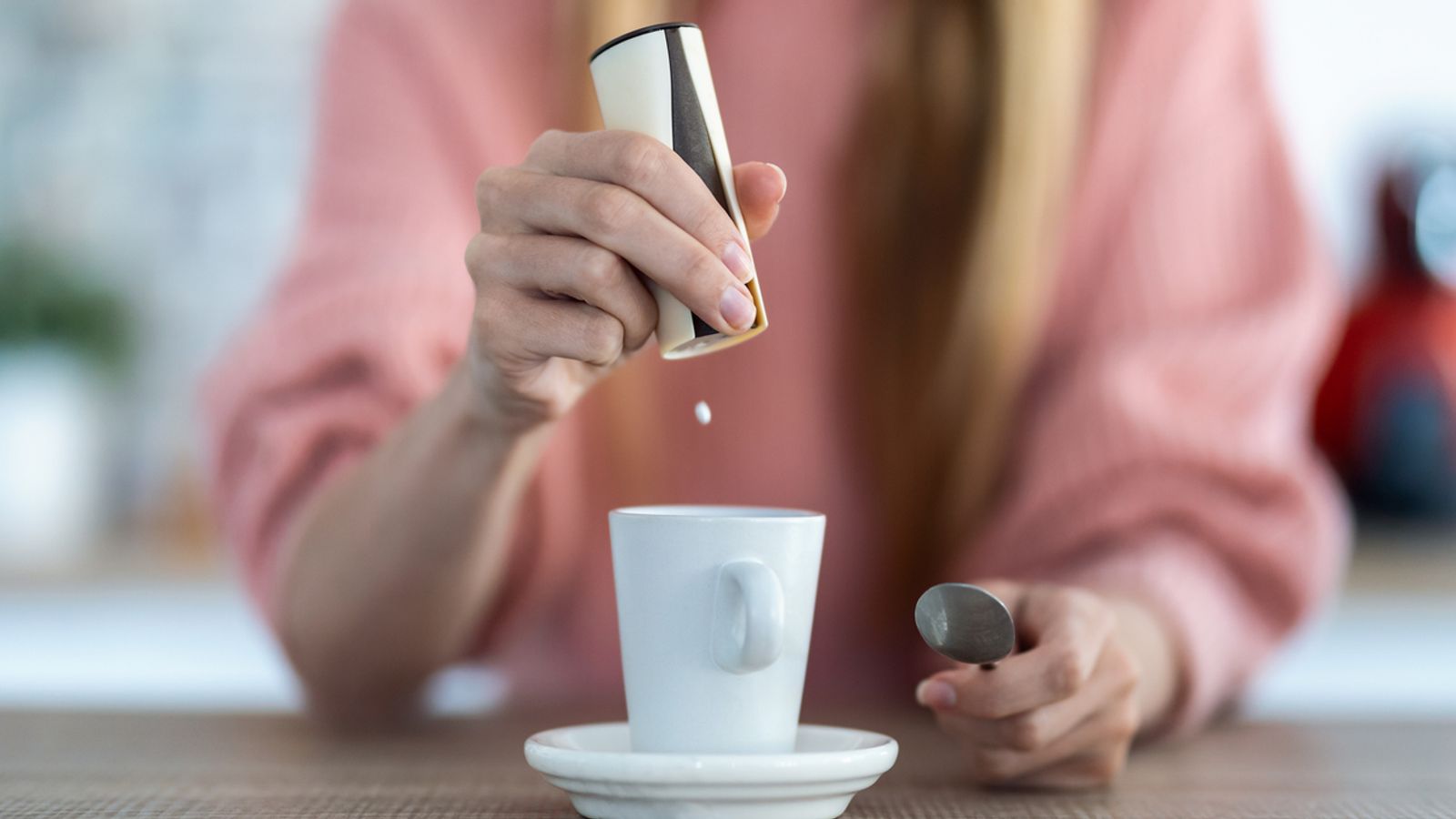Artificial sweeteners linked to higher risk of heart disease, study finds
Researchers in Paris examined participants’ intake of sweeteners from all dietary sources including drinks, table top sweeteners, and dairy products.
Thursday 8 September 2022 02:06, UK
Why you can trust Sky News
Artificial sweeteners “should not be considered a safe alternative to sugar” after academics found their consumption was linked to a 9% higher risk of heart disease.
Researchers from Sorbonne Paris Nord University in France also found artificial sweetener consumption was linked to a nearly 20% higher risk of conditions which affect blood flow to the brain.
The study examined participants’ intake of sweeteners from all dietary sources including drinks, table top sweeteners, and dairy products, before comparing it to their risk of heart or circulatory diseases.
Researchers used more than 100,000 adults from France for the study which was published in the British Medical Journal.
Participants had an average age of 42 and four out of five were female.
Researchers tracked their sweetener intake using diet records.
Participants noted everything they ate, including which brand was used, for 24 hours, with the diet diary repeated three times at six month intervals – twice on week days and once on a weekend day.
MORE FROM UK
The coffin of Queen Elizabeth II, draped in the Royal Standard with the Imperial State Crown and the Sovereign's orb and sceptre, lying in state on the catafalque in Westminster Hall, at the Palace of Westminster, London. Picture date: Sunday September 18, 2022.
Queen dies – latest news: Final goodbyes as Queen’s funeral nears; nation holds minute’s silence; Charles ‘deeply touched’ by condolences
Queen to be laid to rest in state funeral – what will happen today, where and when
King Charles III meeting wellwishers after attending a Service of Prayer and Reflection Llandaff Cathedral in Cardiff, for the life of Queen Elizabeth II. Picture date: Friday September 16, 2022.
King Charles issues message of thanks to nation ahead of Queen’s funeral
Some 37% of participants consumed artificial sweeteners.
During an average follow-up period of nine years, 1,502 cardiovascular events were recorded by participants.
This included heart attacks, strokes, transient ischemic attacks (also known as mini strokes) and angina – chest pain linked to poor blood flow to heart muscles.
Researchers found that artificial sweetener consumption was linked to a 9% higher risk of heart disease.
And when they looked specifically at each type of illness they found artificial sweetener consumption was linked to an 18% higher risk of cerebrovascular disease – conditions which affect the blood flow to the brain.
A specific type of sweetener – aspartame – was associated with a 17% increased risk of cerebrovascular events, while acesulfame potassium and sucralose were associated with increased coronary heart disease risk.
“In this large-scale, prospective cohort of French adults, artificial sweeteners (especially aspartame, acesulfame potassium and sucralose) were associated with increased risk of cardiovascular, cerebrovascular and coronary heart diseases,” the authors wrote.
“The results suggest that artificial sweeteners might represent a modifiable risk factor for cardiovascular disease prevention.
“The findings indicate that these food additives, consumed daily by millions of people and present in thousands of foods and beverages, should not be considered a healthy and safe alternative to sugar, in line with the current position of several health agencies.”
Read more:
Almost 100,000 could have serious heart disease aortic stenosis without knowing – study
Jab to ‘cure’ genetic heart conditions that cause sudden death could be just a few years away
Heart attack and stroke patients waiting half an hour longer for ambulances than pre-pandemic
Commenting on the study, Tracy Parker, senior dietitian at the British Heart Foundation (BHF), said: “Observational studies like these can only show an association, and more research is needed to understand the links between artificial sweeteners and the risk of developing heart and circulatory diseases.
“Most adults in the UK eat too much sugar, and this is linked to health problems such as obesity and tooth decay.
“Artificial sweeteners are an attractive way to reduce sugar intake and before they can be added to food in Europe, the European Food Safety Agency (EFSA) has to approve their use. This is a rigorous process, so you can feel confident they are safe to eat.”

























